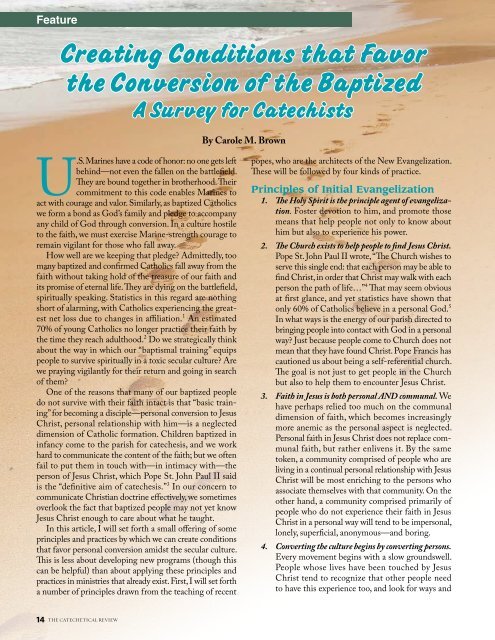Inaugural Issue of The Catechetical Review
Inaugural Issue of The Catechetical Review
Inaugural Issue of The Catechetical Review
You also want an ePaper? Increase the reach of your titles
YUMPU automatically turns print PDFs into web optimized ePapers that Google loves.
Feature<br />
Creating Conditions that Favor<br />
the Conversion <strong>of</strong> the Baptized<br />
A Survey for Catechists<br />
By Carole M. Brown<br />
U.S. Marines have a code <strong>of</strong> honor: no one gets left<br />
behind—not even the fallen on the battlefield.<br />
<strong>The</strong>y are bound together in brotherhood. <strong>The</strong>ir<br />
commitment to this code enables Marines to<br />
act with courage and valor. Similarly, as baptized Catholics<br />
we form a bond as God’s family and pledge to accompany<br />
any child <strong>of</strong> God through conversion. In a culture hostile<br />
to the faith, we must exercise Marine-strength courage to<br />
remain vigilant for those who fall away.<br />
How well are we keeping that pledge Admittedly, too<br />
many baptized and confirmed Catholics fall away from the<br />
faith without taking hold <strong>of</strong> the treasure <strong>of</strong> our faith and<br />
its promise <strong>of</strong> eternal life. <strong>The</strong>y are dying on the battlefield,<br />
spiritually speaking. Statistics in this regard are nothing<br />
short <strong>of</strong> alarming, with Catholics experiencing the greatest<br />
net loss due to changes in affiliation. 1 An estimated<br />
70% <strong>of</strong> young Catholics no longer practice their faith by<br />
the time they reach adulthood. 2 Do we strategically think<br />
about the way in which our “baptismal training” equips<br />
people to survive spiritually in a toxic secular culture Are<br />
we praying vigilantly for their return and going in search<br />
<strong>of</strong> them<br />
One <strong>of</strong> the reasons that many <strong>of</strong> our baptized people<br />
do not survive with their faith intact is that “basic training”<br />
for becoming a disciple—personal conversion to Jesus<br />
Christ, personal relationship with him—is a neglected<br />
dimension <strong>of</strong> Catholic formation. Children baptized in<br />
infancy come to the parish for catechesis, and we work<br />
hard to communicate the content <strong>of</strong> the faith; but we <strong>of</strong>ten<br />
fail to put them in touch with—in intimacy with—the<br />
person <strong>of</strong> Jesus Christ, which Pope St. John Paul II said<br />
is the “definitive aim <strong>of</strong> catechesis.” 3 In our concern to<br />
communicate Christian doctrine effectively, we sometimes<br />
overlook the fact that baptized people may not yet know<br />
Jesus Christ enough to care about what he taught.<br />
In this article, I will set forth a small <strong>of</strong>fering <strong>of</strong> some<br />
principles and practices by which we can create conditions<br />
that favor personal conversion amidst the secular culture.<br />
This is less about developing new programs (though this<br />
can be helpful) than about applying these principles and<br />
practices in ministries that already exist. First, I will set forth<br />
a number <strong>of</strong> principles drawn from the teaching <strong>of</strong> recent<br />
popes, who are the architects <strong>of</strong> the New Evangelization.<br />
<strong>The</strong>se will be followed by four kinds <strong>of</strong> practice.<br />
Principles <strong>of</strong> Initial Evangelization<br />
1. <strong>The</strong> Holy Spirit is the principle agent <strong>of</strong> evangelization.<br />
Foster devotion to him, and promote those<br />
means that help people not only to know about<br />
him but also to experience his power.<br />
2. <strong>The</strong> Church exists to help people to find Jesus Christ.<br />
Pope St. John Paul II wrote, “<strong>The</strong> Church wishes to<br />
serve this single end: that each person may be able to<br />
find Christ, in order that Christ may walk with each<br />
person the path <strong>of</strong> life…” 4 That may seem obvious<br />
at first glance, and yet statistics have shown that<br />
only 60% <strong>of</strong> Catholics believe in a personal God. 5<br />
In what ways is the energy <strong>of</strong> our parish directed to<br />
bringing people into contact with God in a personal<br />
way Just because people come to Church does not<br />
mean that they have found Christ. Pope Francis has<br />
cautioned us about being a self-referential church.<br />
<strong>The</strong> goal is not just to get people in the Church<br />
but also to help them to encounter Jesus Christ.<br />
3. Faith in Jesus is both personal AND communal. We<br />
have perhaps relied too much on the communal<br />
dimension <strong>of</strong> faith, which becomes increasingly<br />
more anemic as the personal aspect is neglected.<br />
Personal faith in Jesus Christ does not replace communal<br />
faith, but rather enlivens it. By the same<br />
token, a community comprised <strong>of</strong> people who are<br />
living in a continual personal relationship with Jesus<br />
Christ will be most enriching to the persons who<br />
associate themselves with that community. On the<br />
other hand, a community comprised primarily <strong>of</strong><br />
people who do not experience their faith in Jesus<br />
Christ in a personal way will tend to be impersonal,<br />
lonely, superficial, anonymous—and boring.<br />
4. Converting the culture begins by converting persons.<br />
Every movement begins with a slow groundswell.<br />
People whose lives have been touched by Jesus<br />
Christ tend to recognize that other people need<br />
to have this experience too, and look for ways and<br />
14 THE CATECHETICAL REVIEW


